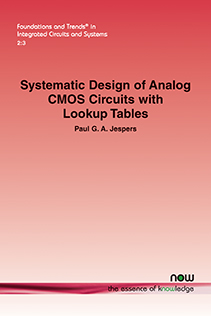Systematic Design of Analog CMOS Circuits with Lookup Tables
By Paul G. A. Jespers, Université Catholique de Louvain, Belgium
Abstract
The idea underlying the methodology described in this monograph consists in the use of a set of Lookup Tables embodying device data extracted prior from systematic runs done once and for all using an advanced circuit simulator, the same as used for final design verifications. In this way, all parameters put to use during the sizing procedure incorporate not only the bearings of bias conditions and geometry, but also every second-order effect present in the simulator’s model, in particular short-channel effects. Consequently, the number of verification simulations one has to perform is not only substantially reduced, but the designer may concentrate on actual design strategies without being bothered by inconsistencies caused by poor models or inappropriate parameters.
Systematic Design of Analog CMOS Circuits with Lookup Tables
Mainstream textbooks explain how electronic circuits work, but cover very little on how to conceive them. That is the aim of this monograph, namely to show readers how they can determine currents, channel lengths and widths of CMOS circuits, so as to optimally satisfy design specifications of electronic circuits.
The idea underlying the methodology described in this monograph consists in the use of a set of Lookup Tables embodying device data extracted from systematic runs done using an advanced circuit simulator, the same as used for final design verifications. In this way, all parameters put to use during the sizing procedure incorporate not only the bearings of bias conditions and geometry, but also every second-order effect present in the simulator’s model, in particular short-channel effects. Consequently, the number of verification simulations one has to perform is not only substantially reduced, but the designer may concentrate on actual design strategies without being bothered by inconsistencies caused by poor models or inappropriate parameters.
This monograph will be of use to engineers and researchers who work on the design of electronic circuits and systems.
